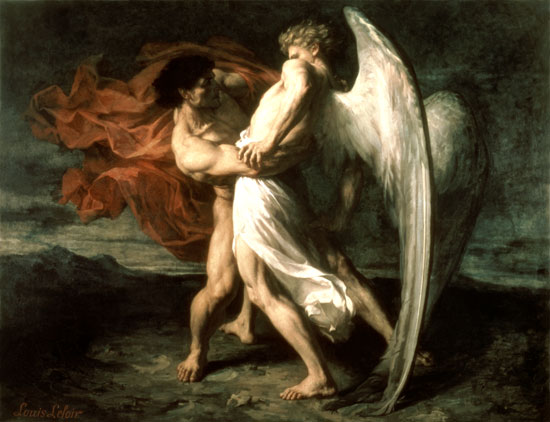Today’s Old Testament lectionary reading is the fascinating story of Jacobs wrestling all night with an angel. Gerard Manley Hopkins makes powerful use of the episode in “Carrion Comfort.”
First of all, here’s the story from Genesis (32:22-28):
That night Jacob got up and took his two wives, his two female servants and his eleven sons and crossed the ford of the Jabbok. After he had sent them across the stream, he sent over all his possessions. So Jacob was left alone, and a man wrestled with him till daybreak. When the man saw that he could not overpower him, he touched the socket of Jacob’s hip so that his hip was wrenched as he wrestled with the man. Then the man said, “Let me go, for it is daybreak.”
But Jacob replied, “I will not let you go unless you bless me.”
The man asked him, “What is your name?”
“Jacob,” he answered.
Then the man said, “Your name will no longer be Jacob, but Israel,because you have struggled with God and with humans and have overcome.”
I turn to the always essential Victorian Web for commentary on the poem:
The poem reprocesses and reissues the original story by making the wrestling match an experience of metamorphosis: The narrator feels himself transformed into a piece of meat at the hands of his attacker. The first stanza, which envisions the narrator reflecting on the long night of wrestling, discusses the strength and abilities of his attacker in the context of nature. His opponent has “lionlimbs” and his right foot is equated to a “rock.” The second stanza envisions a new form of blessing at the hands of the angel, who here becomes a literal expression of God who, in wrestling the narrator, confers upon him joy.
Carrion Comfort
NOT, I’ll not, carrion comfort, Despair, not feast on thee;
Not untwist — slack they may be — these last strands of man
In me ór, most weary, cry I can no more. I can;
Can something, hope, wish day come, not choose not to be.
But ah, but O thou terrible, why wouldst thou rude on me
Thy wring-world right foot rock? lay a lionlimb against me? scan
With darksome devouring eyes my bruisèd bones? and fan,
O in turns of tempest, me heaped there; me frantic to avoid thee and flee?
Why? That my chaff might fly; my grain lie, sheer and clear.
Nay in all that toil, that coil, since (seems) I kissed the rod,
Hand rather, my heart lo! lapped strength, stole joy, would laugh, chéer.
Cheer whom though? the hero whose heaven-handling flung me, fóot tród
Me? or me that fought him? O which one? is it each one? That night, that year
Of now done darkness I wretch lay wrestling with (my God!) my God.


